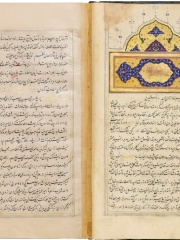

The Most Famous
HISTORIANS from Uzbekistan
This page contains a list of the greatest Uzbekistani Historians. The pantheon dataset contains 561 Historians, 2 of which were born in Uzbekistan. This makes Uzbekistan the birth place of the 38th most number of Historians behind Denmark, and Slovenia.
Top 2
The following people are considered by Pantheon to be the most legendary Uzbekistani Historians of all time. This list of famous Uzbekistani Historians is sorted by HPI (Historical Popularity Index), a metric that aggregates information on a biography's online popularity.

1. Mirkhvand (1433 - 1498)
With an HPI of 62.55, Mirkhvand is the most famous Uzbekistani Historian. His biography has been translated into 19 different languages on wikipedia.
Muhammad ibn Khvandshah ibn Mahmud, more commonly known as Mirkhvand (Persian: میرخواند, also transliterated as Mirkhwand; 1433/34 – 1498), was a Persian historian active during the reign of the Timurid ruler Sultan Husayn Bayqara (r. 1469–1506). He is principally known for his universal history, the Rawżat aṣ-ṣafāʾ ("The garden of purity"), which he wrote under the patronage of the high-ranking functionary Ali-Shir Nava'i (died 1501). According to the German orientalist Bertold Spuler, the Rawżat aṣ-ṣafāʾ is the greatest universal history in Persian regarding the Islamic world.

2. Muhammad Aufi (1171 - 1242)
With an HPI of 60.32, Muhammad Aufi is the 2nd most famous Uzbekistani Historian. His biography has been translated into 17 different languages.
Sadīd ud-Dīn Muhammad Ibn Muhammad 'Aufī Bukhārī (Persian: سدید الدین محمد عوفی; fl. late 12th – early 13th centuries), also known under the laqab Nour ud-Dīn, was a Persian historian, philologist, and author.
People
Pantheon has 2 people classified as Uzbekistani historians born between 1171 and 1433. Of these 2, none of them are still alive today. The most famous deceased Uzbekistani historians include Mirkhvand, and Muhammad Aufi.

